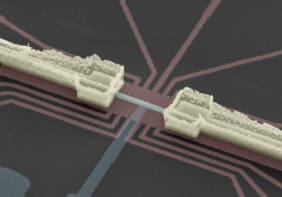Ramy Shelbaya – co-founder and chief executive of UK firm Quantum Dice – talks to Anna Demming about how the company is using quantum mechanics to generate random numbers, and the challenges and rewards of persuading clients, staff and hardware to work together

Ramy Shelbaya has been hooked on physics ever since he was a 12-year-old living in Egypt and read about the Joint European Torus (JET) fusion experiment in the UK. Biology and chemistry were interesting to him but never quite as “satisfying”, especially as they often seemed to boil down to physics in the end. “So I thought, maybe that’s where I need to go,” Shelbaya recalls.
His instincts seem to have led him in the right direction. Shelbaya is now chief executive of Quantum Dice, an Oxford-based start-up he co-founded in 2020 to develop quantum hardware for exploiting the inherent randomness in quantum mechanics. It closed its first funding round in 2021 with a seven-figure investment from a consortium of European investors, while also securing grant funding on the same scale.
Now providing cybersecurity hardware systems for clients such as BT, Quantum Dice is launching a piece of hardware for probabilistic computing, based on the same core innovation. Full of joy and zeal for his work, Shelbaya admits that his original decision to pursue physics was “scary”. Back then, he didn’t know anyone who had studied the subject and was not sure where it might lead.
The journey to a start-up
Fortunately, Shelbaya’s parents were onboard from the start and their encouragement proved “incredibly helpful”. His teachers also supported him to explore physics in his extracurricular reading, instilling a confidence in the subject that eventually led Shelbaya to do undergraduate and master’s degrees in physics at École normale supérieure PSL in France.
He then moved to the UK to do a PhD in atomic and laser physics at the University of Oxford. Just as he was wrapping up his PhD, Oxford University Innovation (OUI) – which manages its technology transfer and consulting activities – launched a new initiative that proved pivotal to Shelbaya’s career.

OUI had noted that the university generated a lot of IP and research results that could be commercialized but that the academics producing it often favoured academic work over progressing the technology transfer themselves. On the other hand, lots of students were interested in entering the world of business.
To encourage those who might be business-minded to found their own firms, while also fostering more spin-outs from the university’s patents and research, OUI launched the Student Entrepreneurs’ Programme (StEP). A kind of talent show to match budding entrepreneurs with technology ready for development, StEP invited participants to team up, choose commercially promising research from the university, and pitch for support and mentoring to set up a company.
As part of Oxford’s atomic and laser physics department, Shelbaya was aware that it had been developing a quantum random number generator. So when the competition was launched, he collaborated with other competition participants to pitch the device. “My team won, and this is how Quantum Dice was born.”
Random value
The initial technology was geared towards quantum random number generation, for particular use in cybersecurity. Random numbers are at the heart of all encryption algorithms, but generating truly random numbers has been a stumbling block, with the “pseudorandom” numbers people make do with being prone to prediction and hence security violation.
Quantum mechanics provides a potential solution because there is inherent randomness in the values of certain quantum properties. Although for a long time this randomness was “a bane to quantum physicists”, as Shelbaya puts it, Quantum Dice and other companies producing quantum random number generators are now harnessing it for useful technologies.
Where Quantum Dice sees itself as having an edge over its competitors is in its real-time quality assurance of the true quantum randomness of the device’s output. This means it should be able to spot any corruption to the output due to environmental noise or someone tampering with the device, which is an issue with current technologies.
Quantum Dice already offers Quantum Random Number Generator (QRNG) products in a range of form factors that integrate directly within servers, PCs and hardware security systems. Clients can also access the company’s cloud-based solution – Quantum Entropy-as-a-Service – which, powered by its QRNG hardware, integrates into the Internet of Things and cloud infrastructure.
Recently Quantum Dice has also launched a probabilistic computing processor based on its QRNG for use in algorithms centred on probabilities. These are often geared towards optimization problems that apply in a number of sectors, including supply chains and logistics, finance, telecommunications and energy, as well as simulating quantum systems, and Boltzmann machines – a type of energy-based machine learning model for which Shelbaya says researchers “have long sought efficient hardware”.
Stress testing
After winning the start-up competition in 2019 things got trickier when Quantum Dice was ready to be incorporated, which occurred just at the start of the first COVID-19 lockdown. Shelbaya moved the prototype device into his living room because it was the only place they could ensure access to it, but it turned out the real challenges lay elsewhere.
“One of the first things we needed was investments, and really, at that stage of the company, what investors are investing in is you,” explains Shelbaya, highlighting how difficult this is when you cannot meet in person. On the plus side, since all his meetings were remote, he could speak to investors in Asia in the morning, Europe in the afternoon and the US in the evening, all within the same day.
Another challenge was how to present the technology simply enough so that people would understand and trust it, while not making it seem so simple that anyone could be doing it. “There’s that sweet spot in the middle,” says Shelbaya. “That is something that took time, because it’s a muscle that I had never worked.”
Due rewards
The company performed well for its size and sector in terms of securing investments when their first round of funding closed in 2021. Shelbaya is shy of attributing the success to his or even the team’s abilities alone, suggesting this would “underplay a lot of other factors”. These include the rising interest in quantum technologies, and the advantages of securing government grant funding programmes at the same time, which he feels serves as “an additional layer of certification”.
For Shelbaya every day is different and so are the challenges. Quantum Dice is a small new company, where many of the 17 staff are still fresh from university, so nurturing trust among clients, particularly in the high-stakes world of cybersecurity is no small feat. Managing a group of ambitious, energetic and driven young people can be complicated too.
But there are many rewards, ranging from seeing a piece of hardware finally work as intended and closing a deal with a client, to simply seeing a team “you have been working to develop, working together without you”.
For others hoping to follow a similar career path, Shelbaya’s advice is to do what you enjoy – not just because you will have fun but because you will be good at it too. “Do what you enjoy,” he says, “because you will likely be great at it.”



